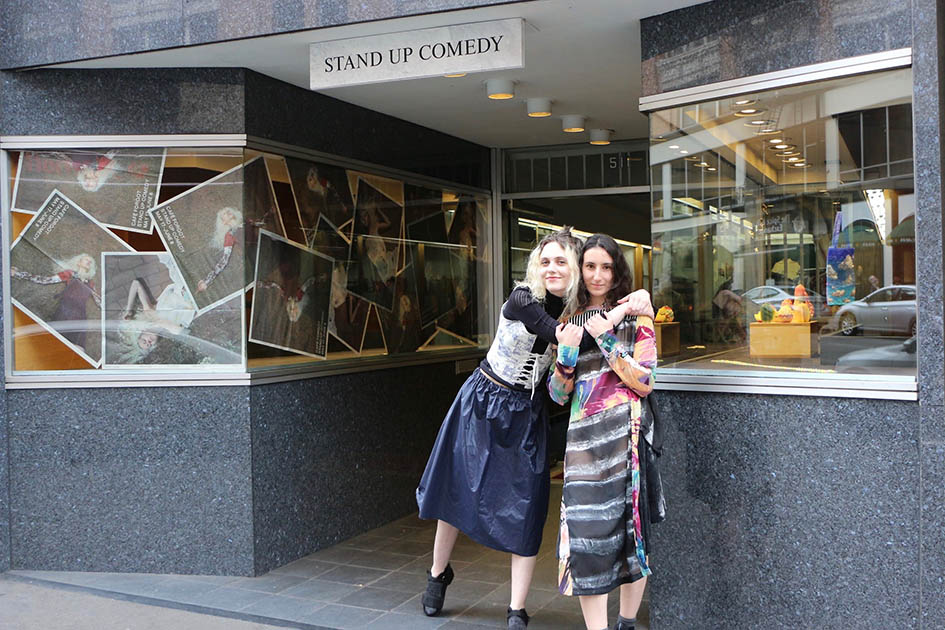Forget Fast Fashion
A new venture hopes to change our relationship with what we wear.
Popular companies like H&M, Zara, and Forever 21 peddle cheap clothing and short-lived trends at alarming rates. But two Reed alumni are trying to help consumers change their fast fashion habits—with upcycled avant-garde clothing. At their New York City pop-up shop, Café Forgot, art history majors Vita Haas '15 and Lucy Weisner '16 champion clothing design as a serious art form, but they also see fashion as an opportunity for adults to experiment with self-expression, have fun trying new things out, and make meaningful connections with the clothing and accessories they buy.
They recently brought their chic, imaginative collection to a pop-up shop in Portland, Oregon, in collaboration with the downtown boutique Stand Up Comedy. Don’t let the names misdirect you: Café Forgot is not Portland’s next specialty coffee shop, and Stand Up Comedy doesn’t host stand-up comics (yet) .
Vita and Lucy have been interested in the avant-garde fashion market since high school. Both majored in art history at Reed, reading extensively about fashion theory. They also took numerous studio art courses and many of their sculpture projects centered on clothing, as they learned to approach fashion as an artistic and intellectual endeavor. They would occasionally escape the academic grind by trying on clothing and accessories at Stand Up Comedy. When they returned to New York City after college, they decided to create a platform for young, emerging clothing and accessory designers with an upcycling emphasis, a "DIY aesthetic and a quasi-punk ethos.” Café Forgot has since appeared in magazines including Vogue, Teen Vogue, Vice, Cultured, and Office.
Vita and Lucy’s aim is to curb homogeneity and encourage individual creativity in clothing retail. They take risks with new, nontraditional designers and approach the one-of-a-kind garments and accessories they curate as art objects. They allow young designers who don’t have the money or experience to produce a “complete collection” in the traditional sense to show their work. “We don’t follow seasons or trends,” says Vita, “we work with designers whose clothes move us. It can be logistically complicated to work with designers who hand-make pieces, but it is that hands-on, human connection that defines our community and makes the clothing we sell unique.”
As a pop-up shop, Café Forgot has only existed in ephemeral, temporary spaces. Vita and Lucy began hosting temporary shops around New York City because of a lack of financing and free time (they both work full-time jobs in addition to Café). They’ve discovered that moving locations and sidestepping the hangups of a permanent lease in New York City has its own advantages. “It enables us to reach new audiences with each pop-up,” says Vita. “Having an end date also creates a special event buzz that bumps support for each shop.” They hope to open a permanent shop eventually, so they can host more community-oriented events, like figure-drawing classes, book clubs, and comedy shows.
When asked whether they have any advice for aspiring fashion enthusiasts or artists just out of college, they suggest doing your own thing while fostering the kind of community you want to be a part of: “Reed taught us to think for ourselves,” says Vita, “and to have the confidence to make long-term goals and stay the course, gifts that extend beyond any particular class or major. Working a service or retail job may feel like a waste of time, but aside from paying the rent, these jobs enable you to meet people who can teach you about the business, and, at the very least, help you discover what you don’t want to do!” They also suggest reaching out to people whose work inspires you via email or Instagram DM, regardless of how awkward it may feel. “Even if it does’t land you a job, talking to someone about their experience can help you more than you know,” says Vita, “and you’ll be surprised by how happy they are to do it. People love talking about themselves!”
Café Forgot will be open from 11 a.m. to 6 p.m., Mondays through Saturdays, and Sundays from 11 a.m. to 5 p.m., from May 17 through June 8, at 511 SW Broadway.
